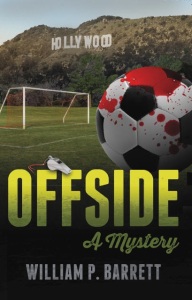 My debut novel was just published, and I hope it doesn’t prove to be too autobiographical.
My debut novel was just published, and I hope it doesn’t prove to be too autobiographical.
The title is OFFSIDE: A Mystery. The one-sentence summary: The murder of an adult referee of youth soccer in a ritzy Los Angeles suburb at the height of the real estate bubble in 2006 is blamed on a loud-mouth coach upset about a call.
The reason for my concern? I have been an adult referee of youth soccer now for 17 years, in New Mexico, the Los Angeles area and–since becoming New To Seattle in 2011–around Puget Sound.
On occasion, coaches and parents–but rarely players–yell at me. I’m hardly infallible, but–unlike, say, the Pope–I do have a whistle.
Fortunately, no one has taken such discontent concerning me to that kind of level, in Seattle or anywhere else. I should point out, however, that during my six years of refereeing in New Mexico, the state legislature deemed it necessary to make it a third-degree felony to slug a referee.
This post is a shameless plug for my book, published by Booktrope, of Seattle, and which you can buy on Amazon.com/Kindle by clicking here. (It’s also available on Barnes & Noble/Nook and iBooks.) And since this is a shameless plug for my book, I can write about some of its themes with no fear of an undisclosed bias or conflict-of-interest.
The novel concerns events taking place in the fall of 2006 in the totally made up but allegorically named (by me) Los Angeles suburb of Valley Mirage. It’s a town divided between haves and have-nots fully caught up in the real estate euphoria caused by national policies encouraging home ownership whether or not buyers can afford the purchase.
Referee Rick Hermannik is found murdered, his whistle left in an unnatural place. Suspicion quickly falls upon volunteer coach Diego Diaz, a one-time gang member whose hot Latino rant over an offside call pops up on YouTube. The media eagerly pursue the delicious story line of out-of-control soccer parents. The case is closed–until the boyfriend of Diaz’s grown daughter, Hector Rivera, a former high school soccer star but now a college dropout in a dead-end job, tries to figure out the truth–and himself.
As you might imagine, there is a lot in the novel about soccer: soccer parents, soccer coaches, soccer league officials, soccer culture, soccer laws, and the whole ethos of suburban community youth soccer. I include my take on the history of soccer–all the way back to the Chinese who really invented it–and its very strange evolution in the United States. And yes, I describe in some detail the history of offside, the rule I write is “variously described as a stroke of strategic brilliance or a guarantee of boring low scores.”
But the book also touches on a number of themes far beyond soccer: racism, biased law enforcement, cynical public officials, California’s treatment of native peoples and–without giving away too much of the plot–the off-their-game folks in the Other Washington who regulated our economy. There’s also a fair amount of social commentary by me about topics like Southern California’s conspicuous consumption and other quirks of its history.
While the essence of the plot is sheer fiction, the book itself contains a large amount of historically factual material. (Footnotes documenting the history can be found on the book’s website.) Ever wonder where the name California comes from? The unbelievable but true explanation is in the novel. It’s in perfect harmony with the place that later gave the world Disneyland and Hollywood (and, I would venture, with the book’s underlying message that things are not always as they first appear). I want you to get the book and read to the end. But I will let on that the very last two words of the book are “Alan Greenspan.”
If you’re kind enough to read the book, please consider posting a review on Amazon.com, which can help sales. You can put up comments on Amazon even if you didn’t buy the book there, so long as you have an Amazon account.
Meanwhile, I’m about to leave for refereeing. Here’s hoping my luck continues to hold up.
